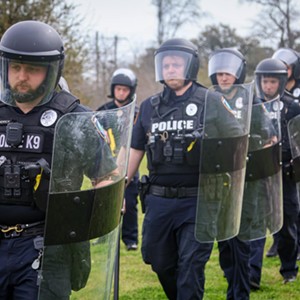HARRY FERGUSON knows firsthand what happens when a young life goes wrong.
“I was incarcerated for the last 25 years on a life sentence,” he said.
“My goal now is to come back and try to make a difference. If I can provide assistance to the community, I will do it.”
Ferguson attended a safety workshop held by the Savannah-Chatham Public Schools Board of Education on March 5 to volunteer to speak to students about his own mistakes. The workshop was held in response to a recent series of fights that have broken out in local schools, resulting in concern about disciplinary issues in the district.
Dr. Prince Jackson Jr., president of the Savannah chapter of the NAACP, told the board “the NAACP is behind you 100 percent” and will be holding a press conference in the near future to express that support.
“You have cancerous tumors in the system,” Jackson said. “To cure cancer, you must remove the tumors.”
Jackson said many students who graduate from Savannah schools go on to do well. “I’m a graduate of this school system, and I went to Harvard,” he said.
Simply throwing money at the problems won’t fix them, May Howard Elementary School PTA President Kelly Bright said. “My philosophy is, don’t complain about something unless you have a solution for it,” she said.
Bright proposed forming a parent task force. “The six hours student have in school don’t compare to the 18 hours at home,” Bright said. “I’d be happy to serve on it.”
With a task force, parents would be required to volunteer at their children’s schools -- and not just at the end of the year. The volunteering would have to be done throughout the year, Bright said.
The board is providing a service to students, and those who fail to follow the rules should be put out, Bright said. “A parent or representative who is responsible for the child must attend a minimum of two parent- teacher conferences,” she said. “If the parents don’t follow the rules, they don’t get to re-register.”
Bright also expressed concern about children who report violations by other students that happen at school. She said she knows of one incident where a child noticed that another student had brought a knife to school and reported it.
No one called the child’s parents to tell them their child had been questioned, and they didn’t find out until a sheriff’s deputy showed up at the door with a subpoena for the child to testify in court. “If a child testifies, the word gets around,” Bright said.
In this case, a plea bargain was reached with the child who took the knife to school, and the witness didn’t have to testify. “There is no legislation in Georgia that says a parent must be notified if their child is involved in witnessing a crime,” Bright said.
A rule should be enacted in Chatham County that parents are to be notified if their children are interviewed or sign a deposition so that they can be protected, Bright said. “Retaliation occurs not in school but on the way home,” she said.
Martha Golden describes herself as “a very concerned parent.” She said bullying is a major problem in the schools that often goes to the heart of other problem areas.
“You can’t put the bullies out because you must educate them also,” Golden said. “I certainly teach my child the rules. He’s in second grade and on the honor roll. I do not want him to be suspended.”
Parent and teacher Audrey Fuller told the board she’s new to the community, but plans on helping the board. She suggested using peer mediators in the schools. “Peer mediators can step in and work with students and try to come up with a resolution,” she said.
Marilyn Johnson has a son in high school. “I talked to my son personally and asked him is safety an issue for him,” she said.
“Fortunately, he doesn’t feel safety is an issue at his school,” Johnson said. “But I want it to be that way for every student at every school.”
Social workers might be needed to go to some homes, Johnson said. “Unfortunately, some parents have already lost control of their children,” she said. “I encourage you to take the advice of the PTA. I’m certain people will volunteer (to help out).”
Superintendent Thomas Lockamy praised the efforts of the district’s principals in recent weeks. “No one can understand until they have walked in your shoes,” he said to those principles in attendance.
Disciplinary measures used in recent days aren’t new, Lockamy said. “We have strengthened them,” he said. “The board of education is taking a tougher stance.”
The board voted to put a dean of students in each high school. Lockamy said eventually there may be as many as three to four deans of students per school.
Paraprofessional monitors will be hired as special assistants to the deans of students. “They will provide additional visibility in the hallways and cafeterias,” Lockamy said.
Campus police presence has been increased throughout the district, Lockamy said. “We have increased the investigative force to arrest persons who violate the rules of conduct,” he said.
Local public safety agencies have been brought together to address the problem, Lockamy said. The support of the Savannah-Chatham Metro Police Department has been sought.
Hand-held metal detectors are being used. “We’ve increased campus police presence at after-school events and activities,” Lockamy said. “We’ve increased the effort to remove banned items, including cell phones.”
Staff visibility between classes and in cafeterias is encouraged, Lockamy said. “This is not just a Band-Aid,” he said. “This will become a part of the culture at the schools.
“We’ve got to reclaim our children,” Lockamy said. “We have to get our academic program on track. We can’t do that if we have disciplinary issues in the schools.”
School board president Joe Buck said that the measures being taken will require the board to spend money. “I do hope these measures are temporary,” he said.
“We are taking money away from the classrooms because of this,” Buck said. “Think of what could be done if we didn’t have to enforce order in the hallways, enforce order in the cafeterias.”
Buck noted that Mayor Otis Johnson and the Savannah City Council held a press conference recently to express their support for the school board’s stance on discipline in schools. “The mayor has instructed the city attorney to work with our attorney and the county attorney in drafting a parental responsibility ordinance,” Buck said.
“There are communities that have the kind of ordinance we’d like to see,” he said. “(Violators) get training after the first violation, a warning and training after the second, and a fine after the third.”
Board member Susu Cox said she has been a school system parent for 15 years and that disciplinary issues cause more concern now than ever. “You see it out in the community, you see it in the schools,” she said.
“It’s a very unfortunate reality, but we have to deal with it,” Cox said. “We have alternate programs, but apparently that’s not enough. It’s a shame we have to remove everything from our formal agenda to deal with fights we’ve had in the high schools. There have always been fights, but it’s gotten to an intolerable level.”
Board member Mickey Stephens said the board wants to enact measures to ensure every school meets the board’s standards. “A line has been drawn in the sand,” he said. “We want to emphasize to parents, these are your children.”
The board has already begun dealing with disciplinary issues, board member Greg Sapp said. “What it takes is seeing that the rules are carried out,” he said. “We have to make sure we support the work of classroom teachers.
“This morning at 9 a.m., we started hearing student appeals,” Sapp said. “We’ve taken the first step on our part.”
Board member Lori Brady said lack of enforcement of policies already in place is a problem. “We will strengthen enforcement of the disciplinary policies to the highest level possible,” she said. “We are educational specialists, here to educate students, not raise children.”
The board should be held accountable by the public, board member Julie Gerbsch said. ”We are the judge and jury for students,” she said.
But others must be accountable, too, Gerbsch said. “If you see fighting in the hallway and see those student in school the next week, I’d like an e-mail or phone call,” she said. “This is a new day. Teenagers are old enough to know the difference between right and wrong.
“We’ve had increased occurrences of 15, 16, 17-year-old kids who are bringing weapons to school,” Gerbsch said. “Nobody can hide under a rock and say they didn’t understand that it was wrong to bring a razor to school, to bring marijuana to school.” 
To comment, e-mail us at
























